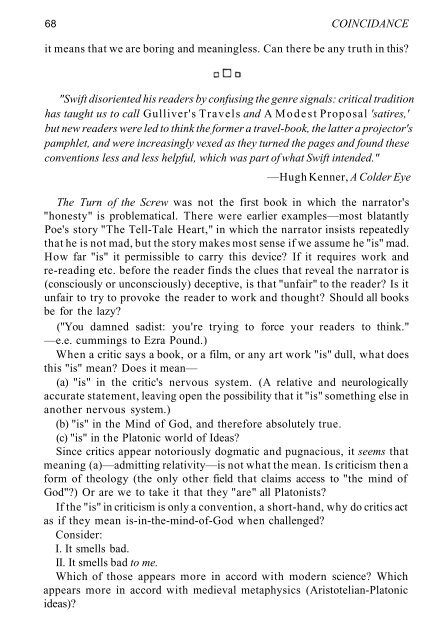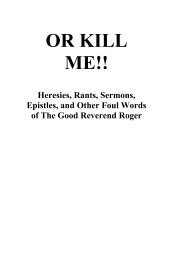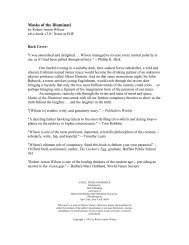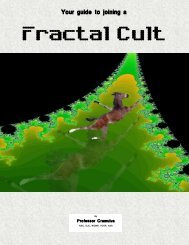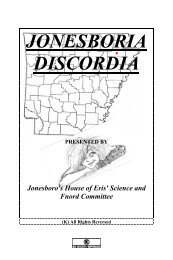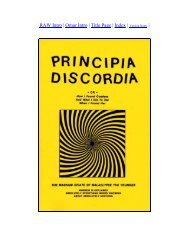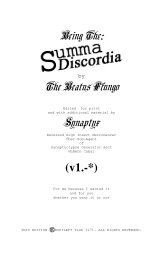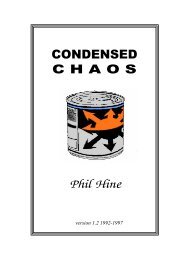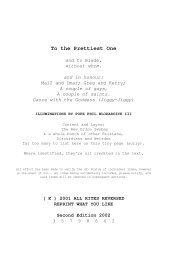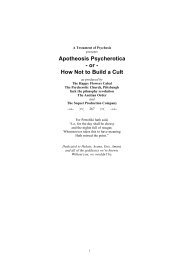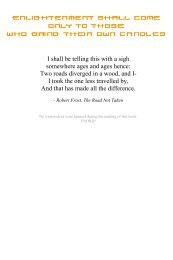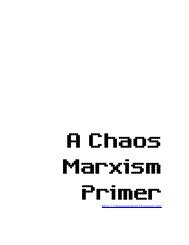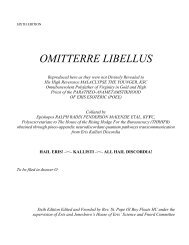Coincidance - Principia Discordia
Coincidance - Principia Discordia
Coincidance - Principia Discordia
You also want an ePaper? Increase the reach of your titles
YUMPU automatically turns print PDFs into web optimized ePapers that Google loves.
68 COINCIDANCE<br />
it means that we are boring and meaningless. Can there be any truth in this?<br />
"Swift disoriented his readers by confusing the genre signals: critical tradition<br />
has taught us to call Gulliver's Travels and A Modest Proposal 'satires,'<br />
but new readers were led to think the former a travel-book, the latter a projector's<br />
pamphlet, and were increasingly vexed as they turned the pages and found these<br />
conventions less and less helpful, which was part of what Swift intended."<br />
—Hugh Kenner, A Colder Eye<br />
The Turn of the Screw was not the first book in which the narrator's<br />
"honesty" is problematical. There were earlier examples—most blatantly<br />
Poe's story "The Tell-Tale Heart," in which the narrator insists repeatedly<br />
that he is not mad, but the story makes most sense if we assume he "is" mad.<br />
How far "is" it permissible to carry this device? If it requires work and<br />
re-reading etc. before the reader finds the clues that reveal the narrator is<br />
(consciously or unconsciously) deceptive, is that "unfair" to the reader? Is it<br />
unfair to try to provoke the reader to work and thought? Should all books<br />
be for the lazy?<br />
("You damned sadist: you're trying to force your readers to think."<br />
—e.e. cummings to Ezra Pound.)<br />
When a critic says a book, or a film, or any art work "is" dull, what does<br />
this "is" mean? Does it mean—<br />
(a) "is" in the critic's nervous system. (A relative and neurologically<br />
accurate statement, leaving open the possibility that it "is" something else in<br />
another nervous system.)<br />
(b) "is" in the Mind of God, and therefore absolutely true.<br />
(c) "is" in the Platonic world of Ideas?<br />
Since critics appear notoriously dogmatic and pugnacious, it seems that<br />
meaning (a)—admitting relativity—is not what the mean. Is criticism then a<br />
form of theology (the only other field that claims access to "the mind of<br />
God"?) Or are we to take it that they "are" all Platonists?<br />
If the "is" in criticism is only a convention, a short-hand, why do critics act<br />
as if they mean is-in-the-mind-of-God when challenged?<br />
Consider:<br />
I. It smells bad.<br />
II. It smells bad to me.<br />
Which of those appears more in accord with modern science? Which<br />
appears more in accord with medieval metaphysics (Aristotelian-Platonic<br />
ideas)?


